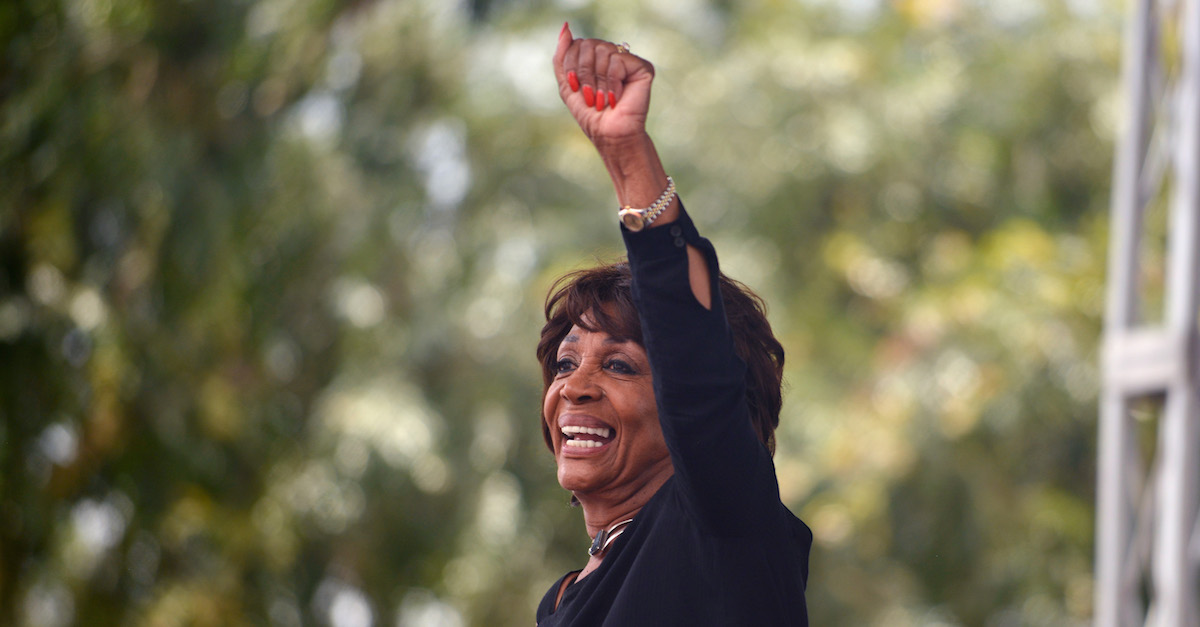
Rep. Maxine Waters (D-Calif.) attends the L.A. Pride Resist March on June 11, 2017 in West Hollywood, California.
Sued by Rep. Eric Swalwell (D-Calif.) for allegedly inciting the assault on the U.S. Capitol, former President Donald Trump tried to dismiss the lawsuit on Tuesday by attacking another Democratic Congress member from California.
Trump’s latest salvo comes months after Swalwell accused him, his son Donald Trump Jr., and Rudy Giuliani of sparking the siege of the Congress through “violence-laced calls for immediate action.” His election fraud conspiracy theorist lawyer Jesse Binnall, who unsuccessfully tried to subvert the 2016 presidential election results in Nevada on bogus claims of dead voters, described Rep. Maxine Waters (D-Calif.) as “far more culpable for inciting violence” than Trump, on the grounds that Black congresswoman has spoken in favor of confronting members of the former administration.
“Congresswoman Maxine Waters was far more culpable for inciting violence when she encouraged people to harass Trump Administration appointees, and when she recently encouraged rioters to ‘get more confrontational‘ if her favored verdict was not returned in the State v. Chauvin case in Minnesota,” Binnall asserted in a 49-page memo.
The sentence trashing Waters had markings for two footnotes, but the lawyer appears to have forgotten to add the citations, which are not in the filing.
In each of the controversies Binnall cites, Waters claims that she was taken out of context. The first involved the congresswoman’s comments to those protesting the Trump administration’s family separation policy in 2018.
“Let’s make sure we show up wherever we have to show up, and if you see anybody from that Cabinet in a restaurant, in a department store, at a gasoline station, you get out and you create a crowd,” Waters told her supporters at the time. “And you push back on them. And you tell them they’re not welcome anymore, anywhere.”
Those remarks made waves because they fell after Trump administration officials were protested at restaurants, in incidents that Waters contextualized as part of an historical tradition of civil disobedience and confronting public officials.
In such encounters, Trump administration officials had their meals disrupted, but nobody was injured or assaulted, unlike the hundreds of police officers at the U.S. Capitol on Jan. 6.
Waters’ other remark cited by Binnall, urging protesters to “get more confrontational” in relation to the Derek Chauvin case, is a bit more murky. Waters made that remark when addressing a crowd in Brooklyn Center, Minnesota, the site of another death at the hands of police.
“We’re looking for a guilty verdict,” Waters said at the time, with jury deliberations then-ongoing in the Chauvin case.
She was then asked two questions, one about what should be done in the event of Chauvin’s acquittal, to which Waters responded: “I didn’t hear you.”
Then asked, generally, what should protesters do, Waters replied with the “confrontational” line.
Legal experts tend to bristle whenever elected officials publicly state their preference for a verdict during active criminal proceedings, and indeed, Judge Peter Cahill—who presided over Chauvin’s case—called the congresswoman’s remarks “disrespectful to the rule of law.” But the fuller video, selectively edited in some corners, shows Binnall’s characterization skewed in two respects. Waters was addressing peaceful protesters, not rioters, during her speech, and it is entirely unclear from the video whether the congresswoman’s remarks were tied to the outcome of the trial.
One of the key lawyers behind Trump’s unsuccessful efforts to sabotage official election results across the country, Binnall lobbed 25 different theories about why the 45th president claimed the Nevada election results should not stand. A judge jettisoned each of the hypotheses in turn, finding in every instance that Trump “did not prove” the case “under any standard of proof.” The spectacular failure of that case did not stop Trump loyalist Sen. Ron Johnson (R-Wisc.) from inviting Binnall as a witness about the so-called “voter fraud” claims that failed in dozens of courts across the country.
The Binnall filing on behalf of Trump and Trump Jr. concluded by saying the “baseless” Swalwell suit should be dismissed for lacking standing, failing to state a claim, and for being an “improper attempt to harass and malign a political opponent and his son.”
Read the motion below:
[Image via Chelsea Guglielmino/Getty Images]